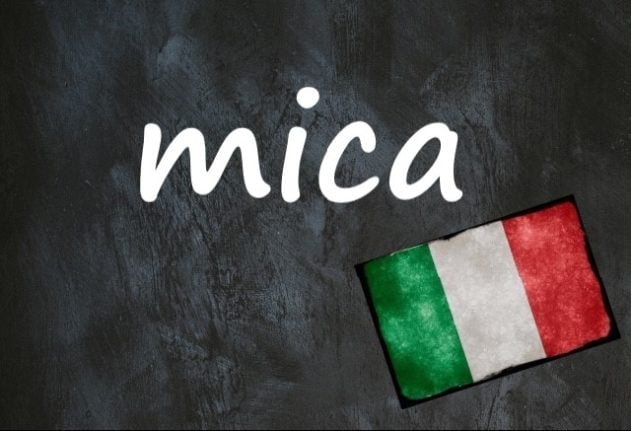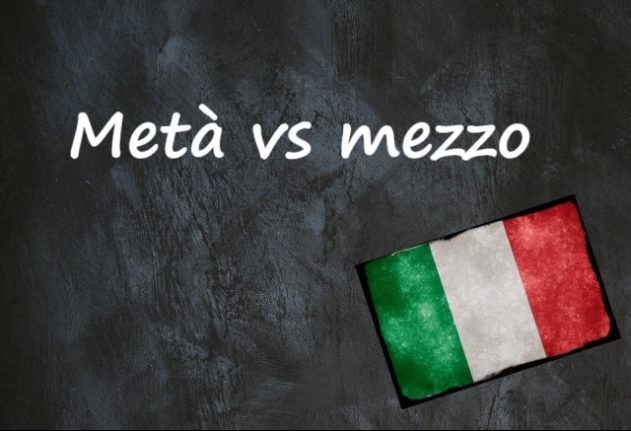Mica is one of those words that seem almost deliberately designed to trip language learners up.
I remember my Italian teacher attempting to explain it to the class and being greeted by a room full of stares that ranged from uncomprehending to suspicious (to be fair, he probably shouldn’t have attempted it in the first week).
Well, stay with us, and we’ll try to pin down the notoriously elusive meanings of mica (hear the pronunciation here).
Let’s start with the one that’s perhaps easiest to grasp: you can use mica to reinforce a negative statement, like saying ‘not at all’ or ‘not one bit’.
Non è mica vero!
That’s not true at all!
Non ci credo mica.
I don’t believe it one bit.
It’s even come to function as a negation all on its own: often you’ll hear Italians drop non (‘not’) and use mica in its place.
Mica male, questa pasta.
This pasta isn’t bad.
Sono mica stanca.
I’m not at all tired.
Used this way, it can have a slightly sarcastic tone, as if you’re really stating the obvious. It’s a bit like when we say something’s ‘hardly’ the case in English.
Mica c’è tanto da stare allegri.
There’s not much to be happy about or That’s hardly something to be happy about.
Mica sono stupido.
I’m hardly stupid or I’m not stupid, you know.
Now here’s where things get a little tricky. That’s how mica works in statements. But it’s also a neat way of asking a question.
By using mica to make a negative phrase that you put to someone else, you’re indicating that you’re not sure of what you’re saying – are they?
(Non) hai mica visto i miei occhiali?
You haven’t seen my glasses, have you?
(Non) ti sarai mica offeso?
You’re not offended, are you?
What’s the difference between that and a normal question? Let’s take the example in English: if you ask “Have you seen my glasses?”, that doesn’t give any information about how what you’re expecting the answer to be. But if you ask “You haven’t seen my glasses, have you?”, it indicates that you’re not holding out for “Yes”. In fact, it sounds like the more likely answer is “No”.
You ask a mica question when you want to signal that you’re not expecting a yes – whether because it’s really unlikely, or just because it sounds less demanding, more polite.
It’s the equivalent of starting your question with ‘I don’t suppose…’ or ‘By any chance…’.
Non hai mica trovato il mio portafoglio?
Have you found my wallet by any chance?
Avete mica il pane senza sale?
I don’t suppose you have any unsalted bread?
As you can see, mica does an awful lot of work: it changes the tone of a phrase in a way that English requires a whole bunch of words to achieve.
Mica male for such a small word, no?

Do you have an Italian word you’d like us to feature? If so, please email us with your suggestion.
Don’t miss any of our Italian words and expressions of the day: download our new app (available on Apple and Android) and then select the Italian Word of the Day in your Notification options via the User button.



 Please whitelist us to continue reading.
Please whitelist us to continue reading.
Your Italian Words’ section is great fun
The lay out very special and the words are, of course, tremendously interesting and well explained and amusing to read. After so many years in Italy there were still a few I never heard of.
If I may say so, I hink it is a waste to let them linger in the anals of
The Local.
Would it be an idea to make a little booklet of those words and expressions. So one can present newcomers and oldtimers in Italy with an unexpected little present. And others as well
I noticed that so many foreigners immediately start with these words as they hear them so often. ‘Allora’ is the greatest favourite according to a friend who was counting how many times it was used in an hour, followed by ‘mica male’. Some,more adventurous used ‘che casino’. My favourite is: ‘Ci mancherebbe altro’. Dorothey
Latin does this, too! When I teach it, I compare it to the kinds of questions parents ask kids–they ask a certain way when they want a certain answer. So it’s not about what the actual answer IS, it’s about what the asker WANTS the answer to be!
There are three ways to ask a YES/NO question in Latin:
neutrally–not expecting either answer–put the interrogative particle -ne at the end of the first word:
Gerisne illam stolam? (“Are you wearing that dress?”)
expecting/wanting a YES, start the question with nōnne:
Nōnne geris illam stolam? (“You’re wearing that dress, right?”)
expecting/wanting a NO, start the question with num:
Num geris illam stolam? (“You’re not wearing that dress, are you?”–note the implied disapproval, perfect for a parent query!)